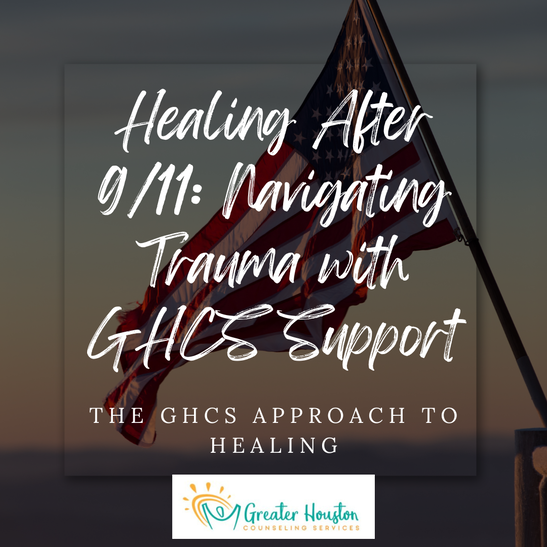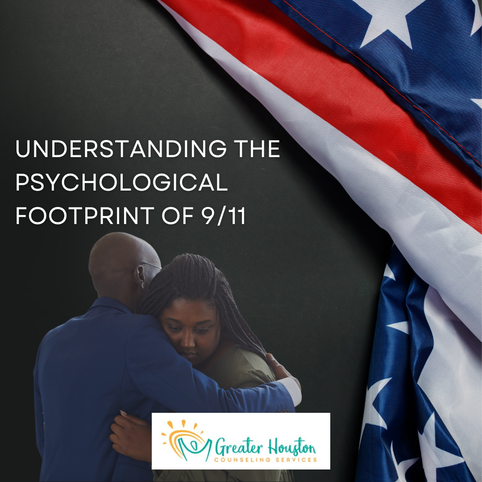|
The tragedy of September 11, 2001, left an indelible mark on our society. The horrifying events of that day, witnessed by millions both directly and via media, led to a surge in mental health issues such as post-traumatic stress disorder (PTSD), depression, anxiety, and substance abuse. Nearly every American remembers where they were on that fateful morning, illustrating the deep collective trauma experienced nationwide. As we acknowledge the enduring psychological impact of 9/11, it is vital to highlight the avenues of healing and recovery available. Greater Houston Counseling Services (GHCS), with years of experience in the mental health field, stands as a pillar of support, offering tailored therapies and interventions designed to aid those grappling with the long-term psychological repercussions of traumatic events, including the experiences stemming from 9/11. Understanding the Psychological Footprint of 9/11 In the aftermath of 9/11, many individuals, especially those who lost loved ones or were directly exposed to the attacks, faced immense psychological distress. This distress manifested as:
The GHCS Approach to Healing At GHCS, we foster an environment of healing through scientifically-backed treatments and coping strategies that include:
A Safe Harbor with GHCS Our mission at GHCS is to be a safe harbor for those on their healing journey, offering a compassionate space to work through the lingering psychological impacts of 9/11. We are committed to helping you navigate the complex path of recovery, building resilience and nurturing hope, one step at a time.
As we remember this significant moment in our history, it is essential to also note the pathways to recovery and healing available to every individual affected. There is a route to healing, and GHCS is here to guide you through it. Let us foster a spirit of community, resilience, and recovery. Remember, it is never too late to seek help. For more information on our services, please visit our website. Let’s heal, together.
2 Comments
Greetings, Dear Readers! July is upon us, and it brings not only the summer heat but also a vital cause we hold close to our hearts at Greater Houston Counseling Services (GHCS): National Minority Mental Health Awareness Month. This month, we aim to inform, inspire, and ignite conversation around the topic of mental health in minority communities - a subject often swept under the rug due to social stigma and cultural misconceptions. Mental health, without a doubt, is a universal matter that touches every individual, irrespective of race, ethnicity, or socio-economic status. However, it is essential to acknowledge that minority communities often face unique hurdles in their journey towards mental well-being. These challenges, rooted in systemic disparities and cultural nuances, can make mental health support a steep uphill battle for many. According to Mental Health America, minority communities often report higher rates of stress, potentially linked to the burden of experiences such as discrimination, prejudice, and socio-economic hardships. Yet, despite the pressing need, these communities are less likely to have access to mental health services, less likely to use community mental health services, and more likely to receive lower quality care. These stark realities emphasize the need for more accessible, quality mental health services within minority communities, a cause GHCS is fervently committed to. Throughout July, we will explore this vital topic in depth, looking at the unique mental health experiences of diverse communities, discussing why these disparities exist, and most importantly, highlighting the change needed. We'll be sharing stories from our therapists who work tirelessly to provide mental health support to our diverse client base, sharing their insights, challenges, and hopes. As we delve into this essential subject, we would like you, our readers, to join us in the conversation. This dialogue isn't just for mental health professionals or those who have experienced mental health issues. It is a conversation for all of us because mental health affects us all. It's time we break the silence around mental health in minority communities, replace stigma with understanding, and create a supportive environment where everyone feels comfortable seeking help. Let's use National Minority Mental Health Awareness Month as a stepping stone to create ongoing, open conversations about mental health. Let's inform ourselves and others, share resources, lend a listening ear, and above all, extend kindness and empathy to those around us. Together, we can make a significant difference and ensure that mental health care is accessible, effective, and equitable for everyone in our community. Stay tuned, stay informed, and remember - mental health matters, no matter your background. Until next time, Your friends at GHCS Categories All  Studies in the past have shown the success to happy and lasting marriage is putting your spouse first. As crazy as it may sound, it is the truth that many are scared to hear. Everyone wants a happy marriage, but not everyone wants to put the work to get there. Life changes when you start having children. From the long sleepless nights to days full of joy, but your marriage should only get stronger as the both of you have created a beautiful blessing. Here’s 2 tips how you can have a successful marriage. Boundaries Prior to becoming parents as a couple you should build a foundation that can never be broken. The best gift you can give your children is raising them through a strong and healthy marriage. That starts off by setting boundaries. Boundaries are one of the most important things in marriage. From the start of your relationship you must create boundaries that should never be crossed. Always treat each other with respect. Treat your spouse the way you would like to be treated. You should always talk to each other with love and find healthy ways to communicate. Simply put your spouse first Always put your spouse first, this doesn’t mean you have to choose between your child's well being and your marriage. Instead, it means taking the time to intentionally and actively invest in your relationship with your spouse, knowing that when you and your spouse are connected, you are better parents.Also keep in mind you started this journey with each other alone, and once your kids turn 18 and leave off to college, your spouse will be the only one left. Your kids are only with you for a couple decades until they decide to start their own family, you chose your spouse to be with them forever. You must give your marriage the attention and effort it deserves. Don’t ever forget why you chose them to be your partner in life, and don’t ever stop dating your spouse. The moment we have a child, our world changes and our entire focus is on them. We slowly but surely start putting our marriage aside, because who has time or energy to even think about going on a date right? We’re sleep deprived, tired and every moment we get to ourselves we utilize it to clean, cook, do laundry, etc. Both parents must make the time to continue to spend time together alone. Even if it means waiting until the baby falls asleep to have a movie night in the living room with your spouse on a Friday night. Always make sure some time is being spent alone. Children grow up to be the reflection of their home, wouldn’t you want your children to marry someone who's always going to put them first?  Not getting good sleep like him? You're in the right place! Keep reading. Not getting good sleep like him? You're in the right place! Keep reading. If you've got your struggles getting to sleep and staying asleep throughout the night you're not alone. 1 in 3 Americans self-reported that a lack of sleep effects their daily functioning. Getting less than 7 hours per night of sleep has been found to be associated with developing diabetes, stroke, heart disease, depression, and anxiety. Here are five ways to help improve your sleeping habits.
2. Save your bed for sleep. Our body's easily become conditioned to things. One thing that can help promote restful sleep and help you get to sleep more quickly is using your bed only for sleeping. This allows your brain to switch into "sleep mode" when you lay down in your bed. Seems easy, but it works. 3. Be consistent. Like most things, consistency is key! Having a consistent time and place to start the winding down process and transitioning into "sleep mode" allows your body to predict what's coming next. You will find yourself becoming tired by engaging in the routine that you normally do. How do you use that consistency to create a relaxing routine? Keep reading! 4. Get a relaxing bedtime routine. So you've got your consistent time and place for sleep, now what? Relax. Embed methods of relaxation within your routine in order to promote more melatonin release and a sense of calm. This looks different for each person. Some ways to relax might be to take a calming bath, use aromatherapy and essential oils such as lavender, or practicing some meditation or mindfulness exercises (check out our blog post on mindfulness tips and tricks!). Alternate until you find what works for you, then become consistent with it. 5. Exercise regularly. Exercise has so many wonderful benefits. One benefit is the promotion of restful sleep. When you exercise it causes an increase in your body temperature, which naturally drops after the exercise has ended. This post-exercise drop in temperature could help promote falling asleep. Try exercising in the afternoon or later in order to see the most benefit to your sleeping patterns. Our sleep habits effect our overall physical and mental health. Getting a better sleep every night is a great way to improve your health. Need support developing better sleeping habits and improving your mental wellness? We can help! Check out our services. Ready to schedule an appointment? Give us a call today! Categories All |
Archives
January 2024
Categories
All
|
|
|
Share This Page
Greater Houston Counseling Services
"Making your day a little easier" Phone: (832) 717-7166 |
Four locations across the Houston area |





 RSS Feed
RSS Feed